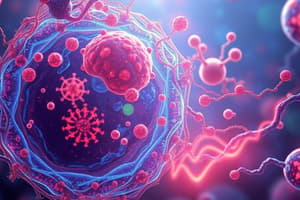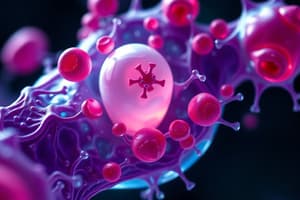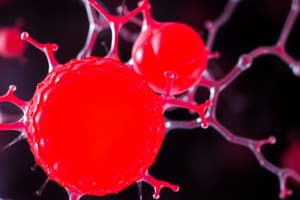Podcast
Questions and Answers
What is the main function of Centrosomes / Microtubule Organizing Centers in a cell?
What is the main function of Centrosomes / Microtubule Organizing Centers in a cell?
- Store macromolecules
- Regulate cell communication
- Form spindle fibers essential in cell division (correct)
- Initiate programmed cell death
Which process involves the specialization of cells into distinct functional types?
Which process involves the specialization of cells into distinct functional types?
- Differentiation (correct)
- Signal transduction
- Apoptosis
- Cell Division
What do Vacuoles primarily act as in a cell?
What do Vacuoles primarily act as in a cell?
- Generation of ATP
- Transporters of genetic material
- Storage sites for macromolecules and pigments (correct)
- Energy production centers
Which activity involves transferring information from outside the cell to alter cell behavior?
Which activity involves transferring information from outside the cell to alter cell behavior?
How do discoveries in cell biology research impact daily lives?
How do discoveries in cell biology research impact daily lives?
What role does communication between cells play in tissues and organs?
What role does communication between cells play in tissues and organs?
Which organelle is responsible for sorting and modifying newly synthesized proteins and lipids?
Which organelle is responsible for sorting and modifying newly synthesized proteins and lipids?
What is the main function of lysosomes in a cell?
What is the main function of lysosomes in a cell?
Which organelle is responsible for converting nutrients into ATP through oxidative phosphorylation?
Which organelle is responsible for converting nutrients into ATP through oxidative phosphorylation?
What is the function of ribosomes in a cell?
What is the function of ribosomes in a cell?
Which organelle is involved in separating intracellular components from extracellular environments?
Which organelle is involved in separating intracellular components from extracellular environments?
Where does photosynthesis occur in plant cells?
Where does photosynthesis occur in plant cells?
Study Notes
Exploring Cell Biology
Cell biology forms the foundation of modern biology, studying life's basic units—the cells—from structure and function to interactions within living organisms. From single-cell microbes to multicellular creatures like humans, understanding cell biology provides insights into fundamental aspects of biology and inspires innovative medical treatments.
Key Concepts and Organelles
At the heart of cell biology lie specialized structures called organelles, each with unique functions. These include:
- Plasma Membrane: Separates intracellular components from extracellular environments while regulating transport of molecules and signals across the membrane.
- Endoplasmic Reticulum: A network of membranes where proteins and lipids are synthesized before modification, folding, and transportation.
- Golgi Apparatus: Sorting and modifying station for newly synthesized proteins and lipids.
- Ribosomes: Translate messenger RNA (mRNA) to produce polypeptide chains, building blocks of proteins.
- Lysosomes: Digestive organelles containing hydrolytic enzymes breaking down waste materials, damaged organelles, and engulfed particles.
- Mitochondria: Energy powerhouses converting nutrients into adenosine triphosphate (ATP) via oxidative phosphorylation.
- Chloroplasts: Photosynthetic machinery found only in plant cells, producing oxygen and reducing carbon dioxide to glucose.
- Centrosomes / Microtubule Organizing Centers: Form spindle fibers essential in cell division and maintain the organization of cytoskeleton components.
- Vacuoles: Storage sites for macromolecules, water, pigments, and organic acids.
Complex Processes and Interactions
Central to cell biology are dynamic processes and interactions occurring within and among cells. These include:
- Cell Division: Proliferation of new cells through mitosis and meiosis.
- Apoptosis: Programmed cell death eliminating dysfunctional cells and facilitating tissue remodeling.
- Differentiation: Specialization of cells into distinct functional types, forming tissues and organs.
- Signal transduction: Transferring information from outside the cell to alter cell behavior and gene activation.
- Communication between cells: Coordination of individual cells to create functioning tissues and organs.
Investigation and Innovation
Discoveries made through cell biology research impact daily lives, from understanding diseases at molecular levels and developing targeted therapies to manipulating cells for regenerative medicine and bioengineering breakthroughs.
Exploration of cell biology continues to challenge existing theories, fuel innovation, and inspire future generations. By embracing curiosity, asking thoughtful questions, and scrutinizing experimental evidence, cell biology expands the boundaries of human knowledge.
Studying That Suits You
Use AI to generate personalized quizzes and flashcards to suit your learning preferences.
Description
Dive into the world of cell biology by exploring key organelles like the plasma membrane, endoplasmic reticulum, and mitochondria, as well as complex processes such as cell division, apoptosis, and differentiation. Understand how interactions within and among cells play a crucial role in biological systems and advancements in medical treatments.




